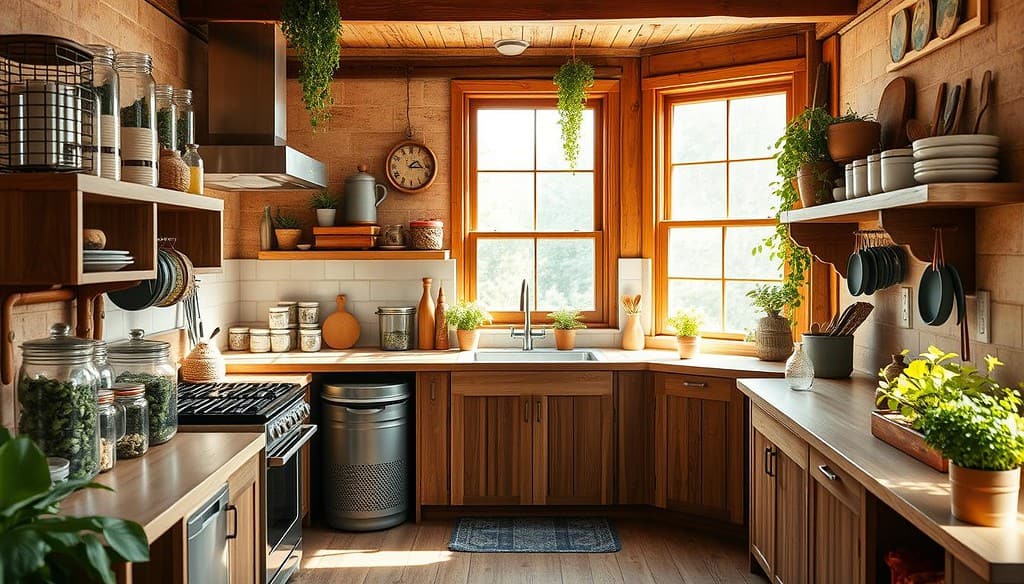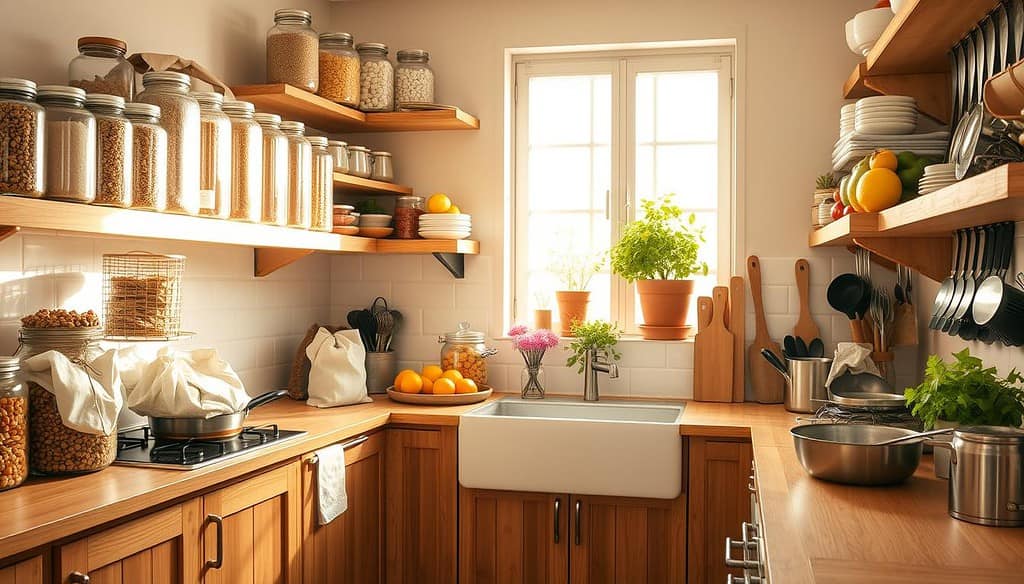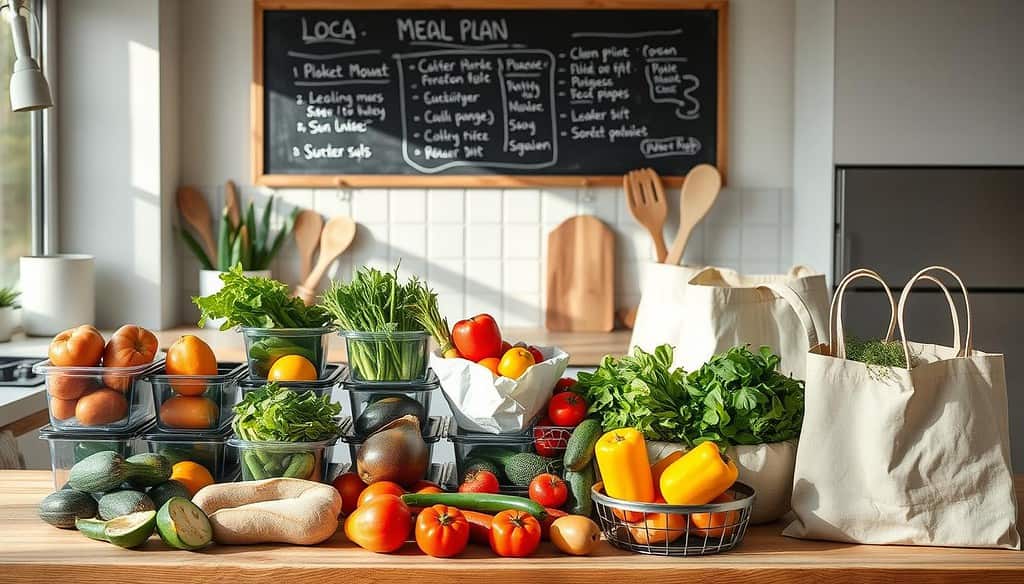
Have you ever thought about how much waste your kitchen makes every day? As a mom and blogger, I’ve been working on making my home greener. I found out that most of our trash comes from the kitchen. But, making a few easy changes can really help the planet.
Let me tell you about some tips that changed my kitchen. They’re simple and effective.
One day, I opened my trash can and was shocked. So much plastic and food was going to waste. That’s when I knew I had to act. By using eco-friendly ways, we’ve cut down on waste, saved money, and feel better about our planet.
Key Takeaways
- The kitchen is a major source of household waste
- Small changes can lead to significant waste reduction
- Zero-waste practices often result in cost savings
- Sustainable kitchen habits benefit the environment
- Implementing eco-friendly ideas can be a gradual process
Are you ready to make your kitchen zero-waste? I’m here to share some tips that worked for me. If I can do it with a busy family, you can too!
Understanding the Zero-Waste Kitchen Concept
As a mom and lifestyle blogger, I’ve found that a zero-waste kitchen is amazing. It’s good for our planet and saves money. Let’s learn more about it.
What is a zero-waste kitchen?
A zero-waste kitchen means no trash. It uses smart shopping, clever cooking, and eco-friendly storage. You’ll use less food and find new ways to use leftovers.
Environmental impact of kitchen waste
Did you know food waste is 16.5% of landfill waste? That’s a lot of food gone to waste! It’s not just money lost, but also bad for the environment. Green kitchen hacks can help a lot.
Benefits of adopting a zero-waste lifestyle
Living without waste is good for the planet and your wallet. Here are some benefits I’ve seen:
- Lower grocery bills
- Healthier eating habits
- Less clutter in the kitchen
- Feeling good about reducing my environmental impact
Did you know 69% of households want sustainable kitchen products? More people are seeing the value of zero-waste cooking.
| Zero-Waste Kitchen Item | Traditional Alternative | Estimated Lifespan |
|---|---|---|
| Reusable produce bags | Single-use plastic bags | 2-3 years |
| Beeswax wraps | Plastic wrap | 1 year (with proper care) |
| Glass food containers | Plastic containers | 10+ years |
Ready to start your zero-waste journey? It’s simpler than you think. The benefits are huge. Let’s look at some easy tips to begin!
Eliminate Single-Use Plastic from Your Kitchen

I used to use a lot of plastic wrap. But then I learned about its harm to our planet. You can change too! Let’s get rid of plastic and make our kitchens better.
First, switch to reusable wraps instead of plastic. Beeswax wraps are great. They’re easy to clean and last long. For the freezer, use cloth bags or glass containers. I’ve saved over 500 bags a year by doing this!
Then, stop using plastic straws. Choose reusable ones from bamboo, steel, or glass. And always carry a reusable water bottle.
Shopping wisely is important. Use your own bags and containers for bulk buys. It cuts down on waste a lot. Plus, buying in bulk can save you up to 50% on food. Saving money and the planet is awesome!
These small changes help a lot. Every step we take makes our kitchens greener. Let’s keep working together to make our homes better.
Embrace Reusable Alternatives for Kitchen Essentials
Switching to reusable items is a big change for a zero-waste kitchen. It makes your kitchen space better. Let’s look at some great options!
Reusable Food Storage Solutions
No more plastic wrap or disposable containers. I use glass jars and stainless steel for leftovers and pantry items. They last long, are easy to clean, and keep food fresh.
Plus, they make my fridge look nice!
Sustainable Cleaning Tools
Using reusable cloths instead of paper towels changed everything. I clean with Swedish dishcloths and microfiber cloths. They soak up a lot, last long, and wash well.
Eco-friendly Food Wraps
Beeswax wraps are my top kitchen pick. They cover bowls, wrap sandwiches, and keep food fresh. They’re better than plastic wrap because they’re reusable and break down naturally.
| Single-Use Item | Reusable Alternative | Benefits |
|---|---|---|
| Plastic wrap | Beeswax wraps | Reusable, biodegradable |
| Paper towels | Cloth towels | Washable, reduces paper waste |
| Plastic utensils | Wooden coconut cutlery | Durable, compostable |

Choosing reusable items does more than organize your kitchen. It helps the planet too. Start small and see your kitchen change for the better!
Zero-Waste Kitchen Tips for Meal Planning and Grocery Shopping
Meal planning is a big help for zero-waste cooking. It cuts down on food waste a lot. Let’s look at some ways to make your kitchen more sustainable.

Start by picking a meal theme for the week. This keeps your kitchen tidy and reduces waste. For example, you might choose Mediterranean one week and Asian-inspired the next. This way, you use the same ingredients for different meals.
Then, go shopping with reusable bags to local farmers’ markets. You’ll find fresh, local food with little packaging. You also help local farmers and cut down on emissions.
The Incredible Edible 10
I use the “Incredible Edible 10” for easy meals. It’s simple:
- Fresh ingredients (vegetables, fruits)
- Protein source
- Spices or herbs
- Starch or grain
- Healthy fat
This method lets you use what you have, so you don’t buy too much.
Level Up Your Meal Prep
You can pick from three meal prep levels:
| Level | Description | Best For |
|---|---|---|
| 1: Basic | Theoretical planning only | Limited time or space |
| 2: Building Blocks | Prep basics like rice, beans, roasted veggies | Balanced approach |
| 3: Doin’ It All | Prepare and portion all meals for the week | Busy weekday schedules |
Being sustainable is more than cooking. Start composting to reduce waste. You’ll see a big difference with these easy steps!
Composting: Turning Kitchen Scraps into Garden Gold
As a mom and lifestyle blogger, I’ve found composting is key for a zero-waste kitchen. It helps our family reduce waste and makes our garden grow better. Here are some tips on composting I’ve learned.
Types of kitchen waste suitable for composting
Did you know you can compost a lot from your kitchen? Fruit and veggie scraps, coffee grounds, and eggshells are all good. Food waste is a big problem in the US, making up 21% of landfills. Composting can really help cut down on this.
Composting methods for different living situations
Even without a big backyard, you can compost. I started with a big compost pile outside. But my city-dwelling sister uses worms in her apartment. Those worms can turn scraps into compost in just 3-6 months!
Using compost in your garden or houseplants
Composting makes amazing soil! I use it in my garden, and it’s made a huge difference. After eight years, my soil is better, and my veggies are healthier. It’s good for the planet and teaches kids about recycling.